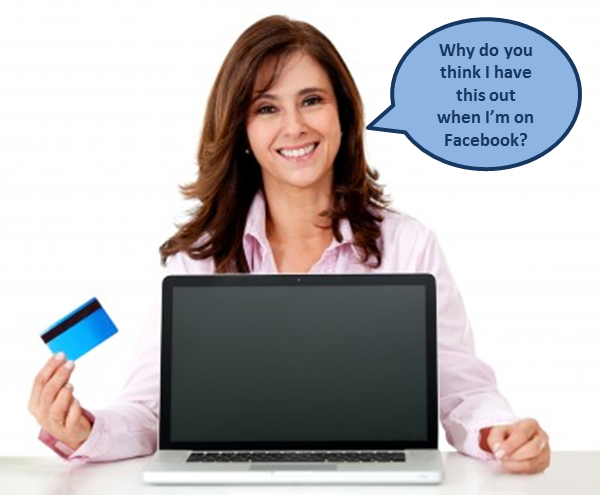You think social media is a channel that it’s not, because you want it to be. All those people right there for the taking with all their interests laid out for you in their profiles. All that talk that lets you know what they’re thinking. It seems like the perfect place to make perfect customer matches. But, it’s not. At least not initially.
People aren’t there to shop
Why not? They are there to share and engage with people about things they care about. They aren’t there to shop. And when you try to interrupt their sharing time with shopping time, it’s annoying. And since you treat them like they want to shop, you use metrics that measure success based upon things that social media as a channel isn’t good at (such as customers shopping). You make it out to be another advertising channel like TV, billboards and banner ads. Or maybe you make it out to be a transactional channel like email or search marketing. It is none of these. It’s a relationship channel (and a surface one at that).
Therefore, the biggest mistake you can make is primarily measuring how the channel is doing in terms of advertising and transactions instead of how it’s doing with conversation and sharing, which is what it is good at. Now, this is not to say that social media doesn’t or won’t lead to transactions. After all, for businesses that is the point.
Healthy relationships take time to develop
But social media is about relationship, and if you want a healthy relationship, you can’t start it off by asking the prospect to come back to your place (your website) and consummate your marriage (purchase). Of course your success rate is going to be low. Consummation on the first date SHOULD be 0% (I said healthy relationships). OK, so asking a customer to purchase is not close to as serious as asking for a person to come back to your place, but you get the point.
When you engage people in social media, they have likely shown no signs of being ready for commitment (ready for purchase) or being confident that you are the one they want to commit to. Therefore, it makes little sense to use metrics that measure those outcomes to be the barometer for social media success. Your approach to social media should be that you are going to be friends with and share with and engage with people that share similar interests as you (what you’re company is about and related things) so that they love you. Then, when they are ready to buy, they’ll use an appropriate channel to buy stuff. Hopefully, they will find you there as well, and now you’ve made a match.
Monitor relationship, not shopping
But for your presence in social media, your measurement should focus on how your relationships are going. Are you having conversations? Are people responding to you? Are they telling people about what you talked about? Are they adding to the conversation? Are you listening well and responding to what they’re saying? The metrics you use to measure this should inform most of your decisions when it comes to investing time and resources into social media. These metrics should also be the biggest gauge on what activities are working and not working (like content created, contests, giveaways, or whatever other strategies you use to cultivate those relationships).
So, when you approach measuring social media success, make sure you ask each metric, “Are you telling me how my relationships are going?” For example, Likes/Followers or whatever the social network you’re using is calling them these days is a sub-optimal metric because it tells you nothing about the relationships/conversations that are going on. It only tells you how many people you could potentially develop a relationship with. Much better metrics would be ones like Comments Per Post or # of Shares. These show how many people thought your conversation was valuable enough to spend time to join and to give their endorsement to by sharing it with their network.
If you can get people to do that, they won’t just “like” you, they’ll become true friends of your brand. Then, when the time is right and they’re ready for commitment (purchasing), they’re pretty confident that you’ll be the one who will treat them right.


3 Responses to Your Biggest Mistake in Measuring Social Media Success